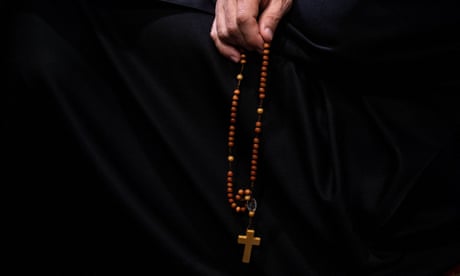- by foxnews
- 08 Apr 2025
Catholic church uses paedophile priest’s death as shield against new allegations in NSW
Catholic church uses paedophile priest’s death as shield against new allegations in NSW
- by theguardian
- 18 Jun 2022
- in news

The Catholic church has used the death of a known paedophile priest to shield itself from being sued over new complaints of child sexual abuse.
Earlier this month, the Lismore diocese won its argument for a permanent stay of civil proceedings brought by a woman who was 14 years old when she was allegedly sexually assaulted by Father Clarence Anderson in 1968 inside her family home.
The woman, referred to as GLJ, brought the claim against the church in the New South Wales supreme court, alleging it was liable for an attack she described as opportunistic, violent, invasive and highly traumatic.
She alleged that the diocese was negligent and breached the duty of care it owed to her, because it knew or ought to have known that Anderson had abused other children.
Documents before the court make it clear the church knew Anderson was abusing boys at least four years before her alleged assault, but did not remove him from the clergy, instead shuffling him through parishes, where he continued to abuse boys.
Knowledge of his abuse was held at senior levels of the church, including by the then bishop of Lismore, who wrote in 1971: "[Anderson] has had a recurring trouble in sexual matters, especially homosexuality. This first came to my notice about some six years ago, and in every case young boys were involved. We have made persistent efforts to help him to overcome his problem, but apparently without any appreciable result."
Another clergy member, Monsignor Ryan, who had early dealings with Anderson in Kyogle, wrote that he once witnessed him "handling boys in the school playground and in his car".
"From the upper floor of the Presbytery I saw him on one occasion with a boy spreadeagled under him over the car bonnet, performing what seemed to be sexual movements upon the boy," he said.
Ryan said he received a complaint in 1965 from a parent who alleged Anderson had abused his son. The parent told him that "it was common knowledge that other boys had been similarly used and supplied the names of six of them".
Anderson was moved between parishes, first to Macksville, then to Maclean, and then to Lismore. Church records show there were complaints of abuse against Anderson in all four parishes.
Despite that history, the church has now twice attempted to have GLJ's civil case thrown out.
It argued that the woman had never complained before Anderson died in 1996. That left them unable to investigate the veracity of her accusations, the church argued, and would make any trial unfair.
Last year, the NSW supreme court rejected the church's application for a permanent stay, saying it had not "discharged the onus of demonstrating on the balance of probabilities that the continuation of the proceedings would be unjustifiably oppressive to the [Lismore Trust] or bring the administration of justice into disrepute in a sense that a fair, albeit not perfect, trial can no longer be had".
But this month the appeal court overturned the earlier decision and granted the permanent stay, saying the "trial could not be a fair one".
"Although Father Anderson is not a defendant, he is a critical witness. Father Anderson died in 1996, before the Lismore Trust was on notice of the allegations," the court ruled.
"It follows that the Trust did not have an opportunity to confront him with the detail of GLJ's allegations and obtain instructions for the purposes of its defence of her claims, nor will it be able to call him as a witness if it so chose."
The child abuse royal commission made it clear that child sexual abuse complaints could often take decades to emerge, because of the shame, trauma and fear associated with surviving crimes of that type. The royal commission's findings led to the removal of limitation periods for civil claims in many jurisdictions.
The court of appeal's ruling could have significant consequences for other civil claims relating to historical child abuse, many of which are made after the death of perpetrators.
It has already been cited in a separate NSW case brought by a child allegedly abused at Trinity Grammar School, who was fighting a decision to have his proceedings permanently stayed. The court said it was having "difficulty in reconciling that case and the present".
The Lismore Diocese said it could not comment due to the potential for a high court appeal.
But, in a statement from its lawyers, the church said its strategy for responding to child abuse claims would "continue to be guided by the unique facts and circumstances of each case".
"Whilst our client normally desires to assist the media it is inappropriate to make any further statements whilst the time period for applying to the High Court has not yet expired," the church's lawyers said.
- by foxnews
- descember 09, 2016
Ancient settlement reveals remains of 1,800-year-old dog, baffling experts: 'Preserved quite well'
Archaeologists have recently unearthed the remarkably well-preserved remains of a dog from ancient Rome, shedding light on the widespread practice of ritual sacrifice in antiquity.
read more


